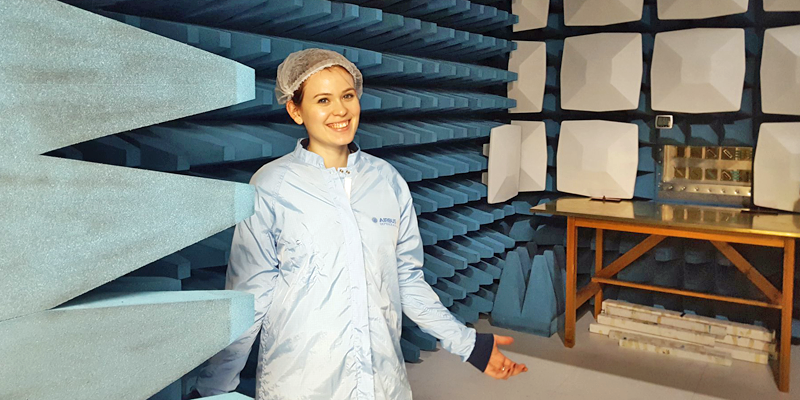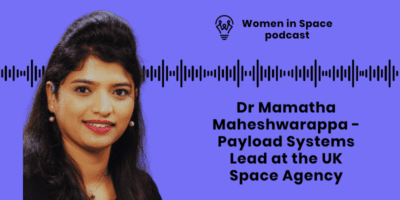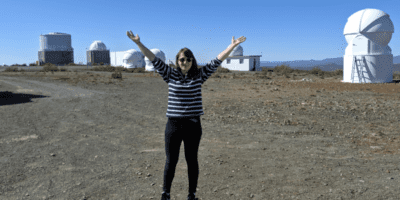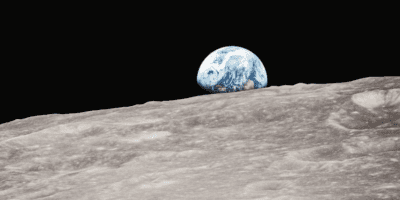Portia Bowman studied for a degree in physics, followed by a Master’s degree in space systems engineering at the University of Leicester. She worked as an engineer on European Space Agency and NASA missions before pursuing a business leadership role. Portia founded Growbotics, a company dedicated to developing technology to enable a circular space economy, and she has recently taken part in a UK Space Agency Accelerator, delivered by a consortium led by Entrepreneurial Spark and Exotopic.
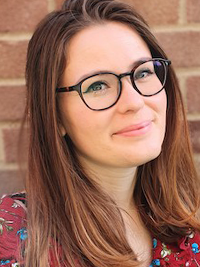
“You can’t look at things from a different perspective if there’s no different perspective and you just keep doing the same things that you’ve always been doing.”
Aiming for the stars
At school I always liked science but I didn’t enjoy maths. I decided to do physics at university, mainly because I had always loved astronomy and looking at the stars, which I found intriguing. So, I opted to study astrophysics but I didn’t want to be a physicist and so I then went on to a Master’s degree in space systems engineering. Both courses were at the University of Leicester so at the time it seemed like the ‘easy’ option to switch path.
The Master’s degree involved going to France and Italy as part of a project for six months with an international group as part of a European Space Agency-style project, which was excellent experience. There was a two-month placement in each country, after which I moved to Italy for a year as a systems engineer, working on the ISS [International Space Station] resupply Cygnus cargo mission, and briefly on ExoMars as a configuration engineer.
I then moved to the UK, for another system engineer role, working on the testing of an Earth observation instrument, and once that had been fully tested and configured, I moved on to future projects. So, right back to the start, I liked looking at innovation and new ideas.
I then took some time out, quit my job and went traveling for three months. I came back to the UK when my brain needed something to do and I worked as a system engineer again for a few months, before joining D-Orbit in 2020, in the week of the first lockdown.
I was working as an innovation manager, which was much more of a business development-focused role, and then I went on to lead the development of the in-orbit servicing business line. At this point, I quit because I wanted to set up my own company.
It’s a definite theme in my career — every time I’ve decided I wanted to do something different, I say “do it”. When you say you’re an entrepreneur, people say: “You’re so brave!” Other people thought I was taking a massive risk, but it didn’t feel like that to me. It just felt like the right thing to do.
Starting Growbotics
I started Growbotics partly because I saw a gap in the market. At D-Orbit they were developing an in-orbit servicing product, which means that you can go and fix your spacecraft after it’s launched, so you might add some fuel, as that’s one of the life-limited items, but basically, you rendezvous and dock with the spacecraft. It then occurred to me that’s not how we’ve ‘done’ space — all satellites are single-use by design at the moment.
Because launch costs have previously been so high, it’s been really inaccessible, but now that commercial and orbit servicing is available, that changes how we design for space, so I want to help spacecraft manufacturers design their satellites in a more sustainable way, looking at how we can circularise the on-orbit economy, so can we reuse stuff. Can we repair satellites? Can we make use of existing things that are on-orbit to mean that we don’t have to launch so much, and we can optimise for that? I’d like us to move towards, produce, reuse, and recycle in space.
The less-than-glamorous life of a space entrepreneur
At the moment, my day-to-day work involves a lot of meetings — talking to people and trying to get the Growbotics name out there and build our credibility. We’re also trying to secure some grant funding in order to develop some new technology.
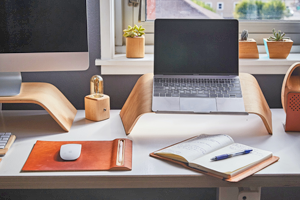
Running your own company sounds really glamorous when there’s travel involved, going to events and networking, but it’s mostly sitting at a computer.
UK Space Agency Accelerator
I got involved in the UK Space Agency Accelerator programme because I had quite a few connections who did the pilot programme a couple of years ago. I saw it was happening and it seemed useful, so I really wanted to do it to get access to all the new expertise and to help me learn how to run a company.
There’s a learning platform where they have small lessons and then assignments so that you can develop your skills in business. All my training to this point has been as an engineer, so what’s unique about the Accelerator is to have access to people who appreciate running a start-up as well as understanding engineering so that they can guide you.
For example, in business, you need a customer and a market, and you also need to be able to manage a cash flow, so you must consider all of these things. I’m trying to learn more about the business side of things and the accelerator’s really good for that.
They’re also trying to encourage really early-stage entrepreneurs to network. They’ve got webinars and sessions where you get support on specific topics, sometimes delivered by specialists from outside the space sector too. You find out how you can access funding streams in the Space Agency that you might not be aware of, so it’s an extremely useful programme.
🚨Deadline extended!🚨Applications for #UKSpaceAccelerator Leo and Geo programmes remain open until 28th April. Don’t miss your chance to drive your business to new heights: https://t.co/7CuiJMiaNA pic.twitter.com/SeIP6nf5la
— Entrepreneurial Spark (@ESparkGlobal) April 24, 2023
I think the main thing I’ve learned is that I need to focus on the strategic side of the business. I have to plan and think about everything, and ask difficult questions, rather than focusing on the immediate urgent deadline. There’s always something urgent, but if you keep doing that you never have time for the strategy. You end up doing tactical stuff because there’s nobody else to do it but the tactical stuff doesn’t immediately make you money, so it’s partly about just accepting that I’ll be jumping from one thing to the next, which is actually what I like doing anyway.
I really want to meet other female entrepreneurs. I know lots of space people so I’d like the opportunity to talk with people from different sectors who have different ideas. From my point of view, I want other women to apply to accelerators too. I’d like there to be more than just a couple of women in the space sector everyone can name. I want it to get to the point where it’s really hard to name all the other female entrepreneurs in space because there are so many of us.
We’re all innovators in our own way
It’s vital to have people around you who aren’t from a space background as it encourages innovation. You can’t look at things from a different perspective if there’s no different perspective and you just keep doing the same things that you’ve always been doing.
The status quo is great if it works, but things are changing and you might get left behind, so it’s essential to have as much diversity of thought as possible because the space sector is all about innovation. And if someone doesn’t feel like they are an innovator they won’t notice they’ve had a new idea because it’s so obvious to them. This is why we need to keep reminding ourselves that we’re all innovators in our own way.
Finding your place in space
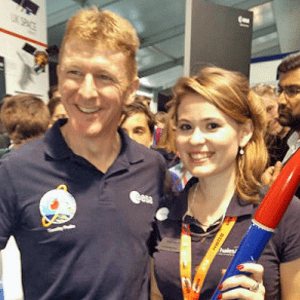
Other than that, I suggest that people interested in careers in space just get involved — go to conferences, and try stuff that you think you might like. The space sector has room for anyone, so if there are things that you’re interested in like sport or music or something else, there’s a way to pursue that and have a link to space too. There are definitely things to do in space other than engineering or physics.
Try different stuff and keep networking. The key to finding out what’s actually going on is asking people questions about what they do. Social media is also great because you can learn about people’s work without even asking in the first instance but then reach out if you do have questions.
Embracing ‘failure’
I was watching the recent Space X launch and even though it wasn’t a total success it was amazing because the intention was to learn, and that’s also how I think.
One of the things that snapped in my head when I left my job was: “I’m going to fail.” The intention is not to succeed. The intention is to learn. And that’s okay. If you don’t try then it’s just boring and you don’t get as far. So, failure is good and it shouldn’t be seen as a negative word because it’s also learning.
I think it’s important to fail fast though so you’ve not spent loads of cash and hopefully you’ve not got to the point where it has a catastrophic effect on your business, so you’ve got an open mindset and you’re planning that you won’t necessarily succeed straight away.
There’s no point in spending years waiting for something to be perfect because if you do fail then it’s worse. The cost of working in space is coming down all the time but it is difficult when you have to spend money on hardware and think: “That rocket that just exploded was SO expensive.” There is definitely an element to it where you have to be intentional, but even if something partially succeeds, that’s still a result. It’s still validation.
Coming up next
I’m hoping I can get a grant to develop my idea and do some work in the lab. The entrepreneurial world can be so fast-moving that it can be really hard to look at what’s happening next week!
I would also love to be able to hire some new talent as I want to give opportunities to a diverse set of people and allow them space to innovate and thrive, because I think that would be for the benefit of everybody.
The UK Space Agency Accelerator is currently accepting applications for its Leo and Geo programmes until 28th April 2023. You can find out more and apply now at www.ukspaceaccelerator.co.uk. The applications for the next Explore cohort will open in June.

